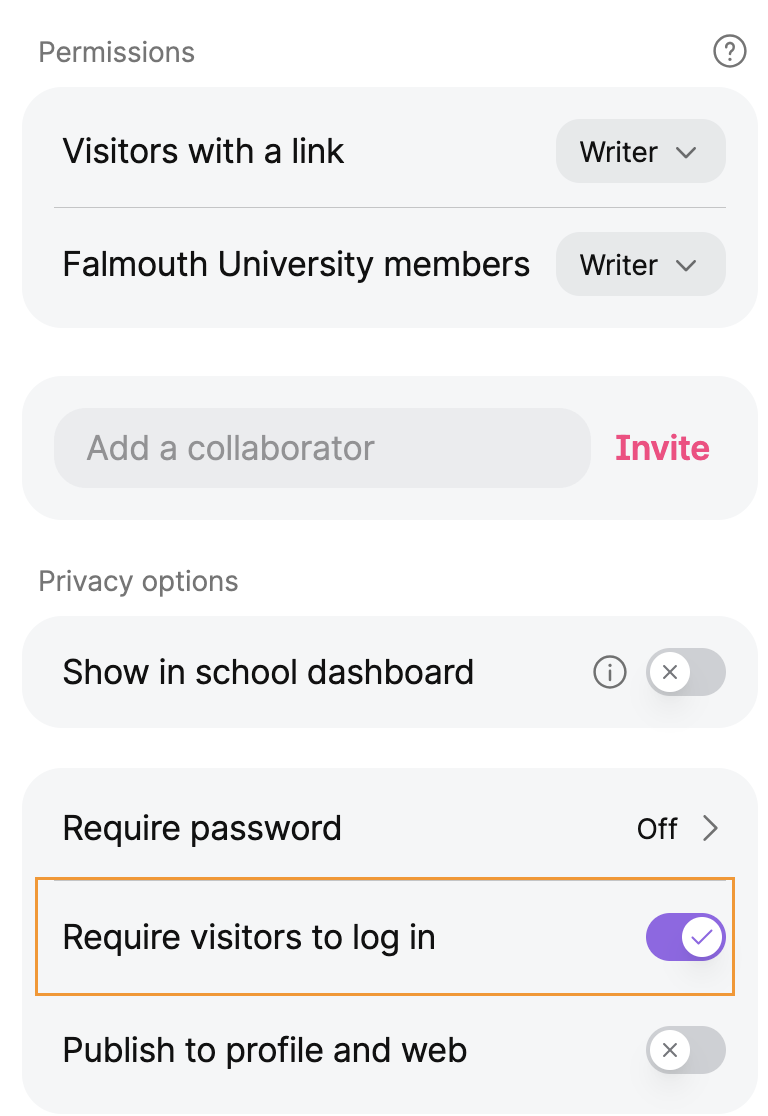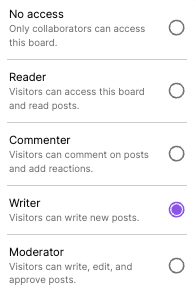Overview
Padlet is an application that enables staff and students to create and share digital boards where collaborators (staff or students) can pin videos, text, images, PDFs etc.
 Important: This guide is for staff teaching on-campus modules. If you are teaching on Falmouth Online, then padlets will be discussed as part of the learning design process. They will be created for you and integrated into the Falmouth Learn (Canvas) by your Learning Technologist.
Important: This guide is for staff teaching on-campus modules. If you are teaching on Falmouth Online, then padlets will be discussed as part of the learning design process. They will be created for you and integrated into the Falmouth Learn (Canvas) by your Learning Technologist.
Contents
- Log in to Falmouth University's Padlet
- Privacy toggle settings
- Your Padlet default settings
- External Visitors
- Link from Learning Space
- Organisation: 3 Steps to action
- Training & Support
- Further Support
Log in
 DO NOT use a Google search for Padlet or create a free account at padlet.com.
DO NOT use a Google search for Padlet or create a free account at padlet.com.
It is important that you follow the steps below to login to your Falmouth Padlet account:
- Go to https://padlet.com/falmouthuniversity.
- Select 'Log in with Microsoft'.
- Use your university email address and password.

Privacy toggle settings
In October 2025, Padlet replaced their original list of privacy options with new privacy selections and toggle options.
The table below shows original settings and the new selection and ‘toggle’ combination equivalents to set the required privacy.
Original Settings | New (toggle) settings |
| Private Personal use only | Visitor permissions – No Access |
| Toggle(s): All OFF | |
| Secret This board will be hidden from the public. Only people with the link can access it | Visitors with a link – Writer Falmouth University members - Writer |
| Toggle(s): All OFF | |
| Secret - Password Only people with the link and password can access this board | Visitors with a link – Writer Falmouth University members - Writer |
| Toggle(s): Require password - ON | |
| Secret - Login Only logged in visitors with the link can access this board | Visitors with a link – Writer Falmouth University members – Writer |
| Toggle(s): Require visitors to login - ON | |
| School (organisation) only Only members of Falmouth university can access this board through the link | Visitors with a link – NO access Falmouth University members – Writer |
| Toggle(s): Require visitors to login - ON | |
| Public | Visitor permissions – Read, Write, Comment Show in Library dashboard – ON Publish to profile and web - ON |
Your Padlet default settings
Account level settings have been updated to apply privacy settings that provide the most secure access for shared Padlets.
The new default settings allow access to ‘School (organisation) only’, which means that staff and students need to log in to their Falmouth Padlet accounts before they can access any Padlet boards shared with them.
Note: If not already logged in to their Falmouth Padlet accounts, students (and staff) will be prompted to login and need to select the ‘Login with Microsoft’ option.
We understand that staff may need to change these settings on occasion (e.g. for external visitor access) so we have not locked this down completely and staff with 'teacher' roles will be able to change the settings of their individual Padlets.
External Visitors
External visitors can access Padlet boards that they’ve been invited to, but with the default settings (see below) will be required to login and if they don’t have a Padlet account, they will be prompted to create one.
To avoid this, Teachers can change the privacy settings of individual Padlets so that login is not required. To change the settings:
- Click the Share panel icon (right menu)

- Scroll down to ‘Require visitors to log in’ and click to toggle Off

- Teachers can also change the default permission (Writer) for ‘visitors with a link’ by selecting from the following options:

Link from Learning Space
In Learning Space, the 'URL resource' can be used to add a link to your Padlet.
Organisation: 3 steps to action
- For Padlets used with students, name your Padlet to match the Learning Space name of the corresponding module e.g. DJP101 An Important Subject S2 (2025/26). This will help you stay organised in future.
- Add at least one other colleague and give them administrator rights. This will allow management of your Padlet if you become unavailable.
- Provide clear instructions for your students.
 Reminder - this guide is for on-campus teaching. If you are teaching for Falmouth Online, padlets will be created for you, named to a specific convention and staff given appropriate access.
Reminder - this guide is for on-campus teaching. If you are teaching for Falmouth Online, padlets will be created for you, named to a specific convention and staff given appropriate access.
Training & Support
If you're having trouble accessing accessing Padlet or if you would like to know how Padlet can be used to support teaching and learning, please use the contact details found in the Further Support section below. For technical support and help with Padlet, please refer to Padlet's help documentation.
 Further support
Further support
For further support on Learning Space, or to report any issues with this guide, please get in touch with the Digital Learning Team via dlsupport@falmouth.ac.uk. Alternatively, please refer to the numerous help guides found on our Knowledge Base.
View the Accessibility Statement for all of our support guides.
